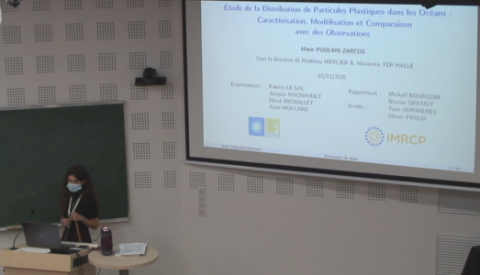Marie Poulain, PhD student at IMRCP, has defended her thesis on the study of plastic particles in the oceans

Marie carried out her research in the SMODD team at the IMRCP laboratory and at the Institut de Mécanique des Fluides de Toulouse (IMFT).
On November 2nd, she defended her thesis entitled: "Study of the vertical distribution of plastic particles in the ocean: characterization, modeling and comparison with observations".
This work investigates the vertical transport of micro-plastics (1 µm<L<5mm) offshore. Often less dense than sea water, they are mixed under the surface due to a surface stirring induced by wind and waves. Thanks to an analysis of samples collected at sea, a model, taking into account the properties (density, size and shape) of micro-plastics is first proposed, to better predict their buoyancy. Then, laboratory experiments using an oscillating grid system have been used to reproduce the surface mixing induced by wind and waves. The transport of idealized plastics (spheres and disks) in this setup is investigated to identify the parameter which controls the coupling between the particles and the flow, the turbulent Schmidt number. For the first time, a value of it is proposed. Finally, recommendations on how to measure and estimate the number of plastics in the ocean are provided with more confidence.
Congratulations to Marie for the quality of her work!
Highlights of the thesis:
> Realization of the open-source application "Plasticount" which allows to make predictions on the quantities of oceanic plastic waste collected in the oceans, by calculating corrected plastic concentrations from surface measurements.
To know more : Small microplastics as a main contributor to plastic mass balance in the North Atlantic subtropical gyre – Poulain M. & al. – Environ. Sci. Technol., 2019, 53, 1157-1164 – DOI
> Participation in a review with several scientists from various fields (oceanographers, biologists, fluid mechanics): The physical oceanography of the transport of floating marine debris – van Sebille E. et al. – Environ. Res. Lett. 2020, 15, 023003 – DOI


